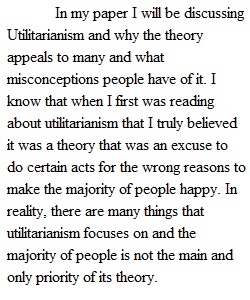


Q The basic instructions for this assignment are to compose a draft version of the paper that your outlined in the first writing assignment. The paper must be, at minimum, 1500 words long, and I will not accept anything below that number. This is just an absolute minimum for length. There is no maximum length requirement (I'll read whatever you write!), but the intentions for the assignment is that you shoot for something a little closer to 2000-2500 words. Just like with the outline, there are not a lot of formatting restrictions that I'm going to impose on you. You've got a lot of freedom about how you want to attack your paper as long as you're fulfilling the general objectives we have for a philosophy paper, as described in the writing guide that I sent out to you before. I would recommend reviewing it once more, since the standards and methods there apply just as equally to the draft as to the outline. I do have advice/suggestions for you however on how to proceed with certain classic elements of a paper's structure. First the introduction paragraph: the introduction of a philosophy paper really is intended to only accomplish 2 (maybe 3) things. It should at minimum state what the thesis of the paper is (i.e. what claim the entire paper will be focused on defending/evaluating), and also give a brief description of the strategic plan you have in defending that thesis. You don't want to surprise your readers here! Let us know where you plan to go and how you plan to get there before we set out on the journey. The final element you might include is a framing of the debate or question that your thesis is an answer to. It can be helpful to your audience to indicate why this debate matters or what is at stake here, but don't overdo it on this! Next let's talk about the conclusion paragraph: the main function here is just take stock of what has been accomplished argumentatively in your paper. It's like a quick summary of what has transpired with your arguments and what their ultimate significance is looking back after we are now familiar with the actual arguments you've made. The bonus option here might discuss "where we go from here" in the debate and could include (unsupported) speculations on what follows from your thesis being true. Again, don't get too extravagant here! I've seen plenty of papers where some of the most interesting and substantial arguments happened in the conclusion, but this is not what we want. Bring that stuff into the paper proper if you want to talk about it! When it comes to everything in between - in other words, the "meat" of your paper where you are giving arguments to support your conclusion and entertaining the objections of your opponent - consider the part of my writing guide that concerns "Organization". Your debate probably has a lot of different facets to it. Keep those clearly established independently for the sake of clarity. Try to stick to doing one thing at a time. And don't worry about clever transition sentences! You don't need to force pretty rhetoric here. In a philosophy paper the primary concern is in protecting the ideas. Keep them clear. Respect what is true and relevant to your discussion. Everything doesn't always line up in a pretty pattern, so don't try to force connections that aren't there. Finally, it should always be clear at every point in your paper how what you are currently talking about connects with your thesis, either in providing support for why we should think that it is true, or in making objections that suggest that it is false. Err on the side of spelling it out for us obnoxiously! Follow the lighthouse. ;) IN TERMS OF GRADING the draft, I will be mostly looking to how you have translated your ideas from the outline to the draft and how much you are updating and editing those arguments in putting together the paper draft. The whole point of the outline is to facilitate your ability to evaluate and edit your original ideas. I have given a lot of comments in the attempt to assist you in this revision process - and maybe push you a bit too! For me, this assignment is all about giving you the experience of engaging in the philosophical process. And writing philosophy is certainly a process! As we think about our beliefs and articulate our defense of them, we change how we think about that topic. This is natural and to be expected/embraced! The goal (as in every debate) is that we leave the process with a better idea of the truth than when we started. Now I won't be grading you just based on how much you've changed your opinion - that would be silly to just change for change's sake. But I do want to see you take the discussion deeper or "to the next level". That means recognizing more of the ways in which your opponent can challenge you, and what ways you've got for responding. And sometimes that might mean that you change your position too. If you are thinking of changing your thesis, consider that as an available option if you think the arguments justify it. But determining this can be tricky, and I'm happy to help you if you're trying to make that judgment call! Stay in contact! :D Previous
View Related Questions